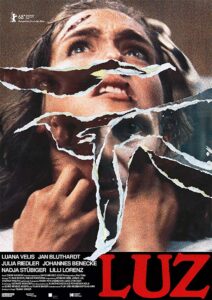Stylish and fascinating, “Luz” is a unique viewing experience.


Reminiscent of experimental horror/science fiction of the 1970s (see the notorious failure “The Visitor”), “Luz” is a success in elegant perplexity. The enigmatic, disjointed story has cab driver Luz Carrara (Luana Velis) wandering into a largely abandoned police station after having an accident. She is said to have leapt from her cab, but the officers who interview her are interested in more than a simple motor vehicle collision.

Meanwhile, in another location, a psychologist, Dr. Rossini (Jan Bluthardt), sits at a bar and drinks, while monitoring his beeper. That piece of dated technology helps establish the time period, which is the pre-cell phone era. The good doctor is approached by an alluring and mysterious woman, who has information about Luz. In time, Rossini visits the police station and assists an officer named Bertillon (Nadja Stübiger) in an odd interrogation.
This is where weird things begin to get even weirder. Writer/director Tilman Singer delivers a strange mix of horror/mystery/thriller told in, at least, three languages (German, Spanish, and English). The themes involve the abuses of organized religion and a supernatural occultist vibe. There may be something extraterrestrial involved as well. This could be analyzed in repeat viewing.

Luz is interrogated in fascinating fashion.
While the narrative is of the bizarre variety, the images carry a throwback feel, complete with grain and artifacts, which is the product of being shot on 16mm film. As his debut, Singer certainly makes a mark with “Luz,” by maturely allowing his camera to sit on a wide master for it seems like minutes on end while the action transpires in the foreground and the background. I heard Woody Allen talk about this technique in the past, but he explained that it was used to save money. Whatever the reason, the deep depth of field is really interesting as you study it carefully and things manifest themselves in parts of the image.

Singer’s restrained visual approach in which the camera is locked down is in stark contrast to today’s frenetic shooting styles. And his cast is in on the gimmick, committing themselves to odd movements and stage-like blocking that only accentuates the off-kilter tone. I wouldn’t want to spoil things, but it is enough to say that actors in particular will want to watch this film as the performances and approach will remind one of the work of Lars von Trier (see “Dogville”). It will be off-putting to some, but if you know what you’re getting into, it’s something unique in the marketplace.

This kind of experimental cinema should be celebrated, even it is won’t satisfy a broad segment of viewers. Compare Gaspar Noé’s interesting failure “Climax” released earlier this year. Both “Luz” and “Climax” feature lurid, adult subject matter that hinge on sexual violence, but “Luz” is remarkably more effective as a coherent narrative, even its thematic underpinnings remain mercurial. Noé just couldn’t help himself, by diving deeper and deeper into depravity, his film became a self-indulgent mess that effectively undercut the brilliant dance sequences that led the film. Singer takes a slightly more palatable road, and relies on the supernatural to explain the unexplainable and pull back on the lurid and the repulsive. I liked it. I liked it a whole lot.
While “Luz” is a throwback that owes much to the films of the 1970s and earlier, in today’s theatrical landscape, it’s a fresh, timeless, horrific vision.
